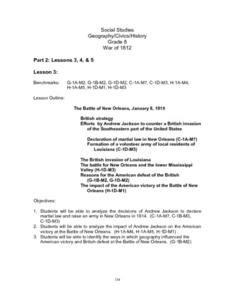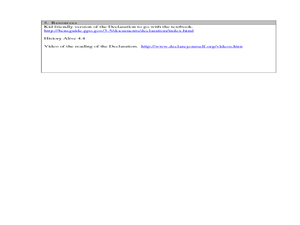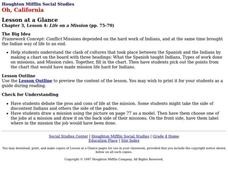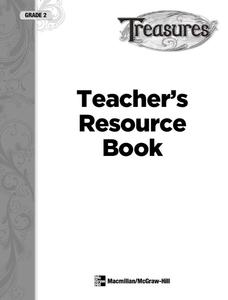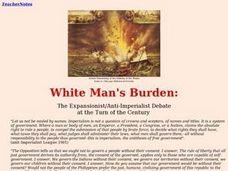Curated OER
War of 1812
Eighth graders locate the major land forms and bodies of water on a map of Louisiana. In groups, they discuss the role of the Mississippi River in the Battle of New Orleans and how land and water affect the outcome of battles. To end...
Curated OER
Political and Cultural Road to the American Revolution
Learners examine the Declaration of Independence. For this Revolutionary War lesson, students use primary sources to analyze how the creation of the Declaration of Independence lead to the development of the United States as an...
Curated OER
Immigration Policy: Past and Present
Students examine the history of the United States' immigration policy. They identify events in history that changed policies regarding immigrants. They discuss new possible legislation as well.
Curated OER
Oh, California
Students begin this lesson by charting information about the relationship between the Spanish missionaries and Native Americans at a California mission. Then, students identify the dynamics of those relationships that would have made...
Curated OER
Property: Ownership, Respect, and Responsibility
Students learn to respect others' property by rating the severity of a variety of damaging acts. Students use a tag board "thermometer" to rate the severity of statements describing situations where a person damages the property of another.
Curated OER
Making an Appeal
Students make an appeal. In this making an appeal lesson students give characteristics of the Washington Supreme Court. Students examine public policy conflicts and present an appellate case.
Curated OER
"Pressing" Issues In Zimbabwe
Students explore the nature of freedom of the press through examining a story about the capture and torture of journalists in Zimbabwe. They participate in a round-table discussion of the issues. They research an African country of their...
Curated OER
Is there a stone in my soup?
Students observe teacher's inappropriate classroom procedures such as tattling, pushing, or interrupting. In this showing respectful behaviors lesson, students respond to scenarios created by the teacher and address what the appropriate...
Curated OER
The Beginnings of Constitutional Government
Students examine excerpts of Thomas Paine's Common Sense. In this early American history activity, students read Paine's pamphlet and analyze the information according the rubric provided.
Curated OER
Bill of Rights -- Americans with Disabilities Act
Students focus on the First and Ninth Amendments of the Bill of Rights. Before visiting a museum, they examine the Americans with Disabilities Act. During the visit, they work together with a museum member to watch a video and get...
Curated OER
Government Lesson Plan: Lesson Plan 12
Students investigate various political systems around the world. They complete a chart that compares the U.S. political system with other nations' governments, conduct research on a selected nation, and present an oral report.
Curated OER
We the People
Students examine both the Preamble of the Constitution and the Bill of Rights. They work in small groups to connect the two documents and analyze how the documents are important to their lives today. They create a poster that visually...
Curated OER
Breaking News English: Aung San Suu Kyi
In this Aung San Suu Kyi learning exercise, students read the article, answer true and false questions, complete synonym matching, complete phrase matching, complete a gap fill, answer short answer questions, answer discussion questions,...
Curated OER
Mesopotamia
Students map Mesopotamia. In this Geography lesson, students are introduced to Ancient Mesopotamia. Students use an atlas to label the defining features and areas of Mesopotamia on a map.
Curated OER
What Would You Do?
Learners study major religions and determine how and why an individual who held each of these beliefs would respond to a similar crisis.
McGraw Hill
Phonics Teachers Resource Book
Looking to improve your classes literacy program? Then look no further. This comprehensive collection of resources includes worksheets and activities covering everything from r-controlled vowels and consonant digraphs, to the...
Curated OER
Traditional Marxist Perspectives on Crime
In this Marxist Perspectives on Crime instructional activity, students read five pages and then proceed to complete several exercises such as supporting and rejecting a thesis, completing sentences, and categorizing statements.
Curated OER
How to Be a Good Citizen
In this citizenship worksheet, students learn about what it means to be a good citizen. They then answer the 20 questions on the worksheet. The answers are on the last page.
Curated OER
Supreme Court Shake-Up
Students examine the role of the Supreme Court through an interactive program. They analyze the history of the Court and its members. They finally explore how the Supreme Court works.
Curated OER
Fair Responses to Unfair Acts
Students understand the sacrifices and problems in undoing an unfair situation. In this unfairness lesson plan, students discuss the reasons for the Montgomery Boycott and discuss worksheet and feelings about dealing with unfair situations.
Curated OER
African Independence Movements
For this African independence movement worksheet, students respond to 6 short answer questions that accompany a reading selection featuring Uganda, Guinea, Kenya, and Ghana. Students also complete a graphic organizer based on the selection.
Curated OER
Marbury v. Madison (1803)
Students examine federalism and judicial review. In this Supreme Court lesson, students examine primary documents from Marbury v. Madison and discuss the implications of the decision.
Curated OER
White Man's Burden:The Expansionist/Anti-Imperialist Debate at the Turn of the Century
Students explore the roles of Expansionists and Anti-imperialists and take on the identity of a historical character to defend their position before a Senate committee. Roles of newsmen, senators, and futurists are also assumed in this...
Curated OER
Gideon v. Wainwright
Students examine the right to counsel and due process. In this Supreme Court lesson, students examine primary documents from Gideon v. Wainwright and discuss the implications of the decision.
